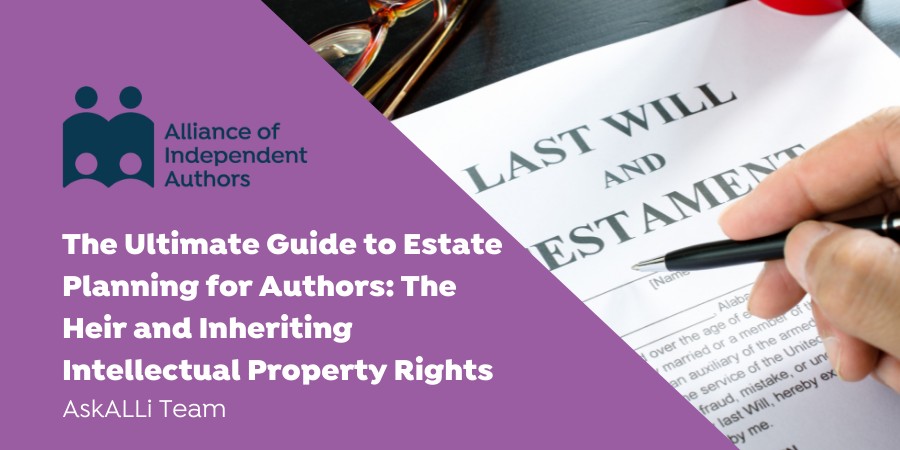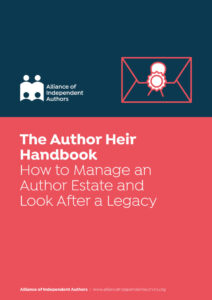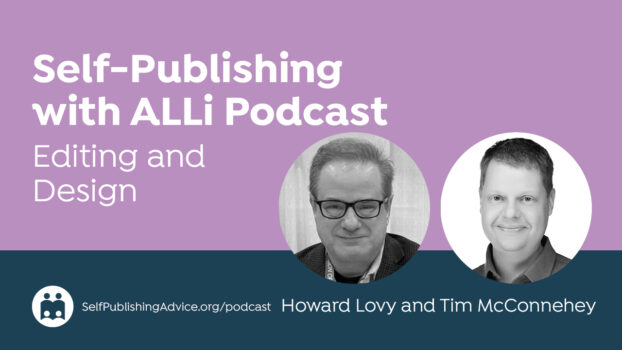We've been discussing our author legacy, our estates and how to best prepare our businesses for our heirs. But there's another side to this, and that's becoming an heir to an author estate. If your relative is an author or creative, then they will have intellectual property that will become your responsibility. Inheriting IP rights can be overwhelming, so let's make the process a little easier for you. Today, the Alliance of Independent Authors discusses estate planning for heirs and the process of inheriting Intellectual Property rights.
The Author Heir Handbook: How to Manage an Author Estate and Look After a Legacy was written by ML Ronn. There is a companion book, The Author Estate Handbook: How to Organize Your Affairs and Leave a Legacy, which you can find out more about in our last post here. Today, we're focusing on heirs. The Author Heir Handbook is a concise guide that will help you overcome frustration and overwhelm by explaining how an author's publishing business works, how the deceased author books can still generate income, and how to manage those components.
If you're an ALLi member, you can download the short guide for free by navigating to our member website and logging in. From there, you need to navigate to PUBLICATIONS > SHORT GUIDES and you'll find both short guides.
What is an Author Estate?
First, let’s define “estate.” According to the Oxford English Dictionary, it is “all the money and property owned by a particular person, especially at death.”
An author's estate does not exist until they die—thus why they must plan for its eventual existence. Such a plan is called an estate plan. In an estate plan, the author must plan for how money and property (also known as “assets”) will be distributed after their death. The part of an author’s estate that contains the copyrights is sometimes called a literary estate.
The “executor” (also “executrix” or “personal representative”) is the person the author designates to run the estate, settle the author's affairs, and handle the money, usually designated in a will. A court must appoint an executor. If you're reading this, those responsibilities have probably fallen upon you.
“Heirs” (also known as “beneficiaries”) are the people the author designates to receive (or benefit from) the assets. Heirs are usually spouses, children, or grandchildren, but not always. In addition to being an executor, you are probably also an heir, and you may be responsible for sharing the author's assets with other heirs.
Here's the key difference between the estates of a typical person and an author.
In a typical person's estate, the income stops when a person dies. Their assets are distributed and their estates are settled in court via probate or through a trust. When the judge bangs the gavel, everyone moves on. The author, however, has created an estate where the heirs don’t have that luxury. The traditional parts of the author's estate will be settled like everyone else’s, but the author part of the estate will be an ongoing responsibility. This is because the author's books will continue to generate income, and, in many countries, will do so for 70 years after the author's death. Even after that, the estate can still profit from the author’s work!
You’ve Inherited a Small Business
The first concept for you to understand is that by inheriting an author’s books, you are inheriting a small business.
This might sound strange, especially if the author didn’t treat their books like a business. Many authors don’t like to do that because of preconceived notions about art and business, but we have to live in reality.
A business has expenses and income, and it strives to earn a profit. Before the author published their books, they probably hired editors and cover designers. They also paid for website hosting and advertising. All of these are expenses.
When the author published their books, those books earned income. At tax time, the author had to pay taxes on profits made from their books. So, make no mistake: whether the author treated their efforts like a business or not, you are inheriting a business. If you want to manage the estate correctly, you must treat it as a small business.
Why an Heir Should Maintain an Author Estate
When I talk to people about author estates, they often have a romantic image in their heads. They don’t think they have to do anything. They expect to relax and pursue their own passions while automatic book income hits their bank account every month, with very little effort on their part. What a dream! Unfortunately, that is not what you’re inheriting.
Taking over a book business is a lot of work. You can sit back and take the money if you want, but you’ll find that the money will reduce to almost nothing over time. Think about an author estate in the year 2000. Back then, paperbacks were the predominant book format. E-books didn’t truly exist and audiobooks were on cassettes and CDs. If you were running an estate back then, a publisher would have handled everything for you. It was a very different world.
Fast forward to 2007 and the advent of the Kindle. As the executor, you would have noticed some radical changes:
- Readers were increasingly buying their books online, especially on Amazon.
- The internet transformed society, democratizing book discovery and making it easier for readers to find more books than they ever could before the advent of the internet.
- The Kindle led to an explosion of demand for e-books.
- The rise of smartphones, podcasting, and faster mobile internet connections made it possible for audiobook MP3s to replace physical audiobooks in popularity.
- Authors were becoming more frustrated with traditional publishers, finding ways to get out of their original publishing contracts so that they could self-publish their books and exercise more control.
See how quickly the industry changes? That's just seven years, which is not very much time.
Author Income is Complicated
Inheriting intellectual property rights can be overwhelming, not least because author income is complex. Take some time to review the author's last two years' worth of tax documents. That will tell you where the money is coming from. One important thing to understand about a publishing business in today's digital age is that it consists of many, many streams of income.
Amazon is one stream of income. Apple is another. The average author has dozens of income streams. They may not necessarily report them all to the government. (Though they should!)
Many of the income streams start small. Very small. They might only be a few dollars a year. Others might be gigantic. But expect there to be a lot of income streams because the author with the most income streams wins.
Let me give you an example of all the income streams I currently have in my publishing business.
- I sell e-books at fifty different retailers. Each retailer is a stream of income.
- I sell paperbacks at three retailers, with the ability to sell to bookstores and libraries.
- I sell audiobooks.
- I sell books directly on my website.
- I sell online courses.
- I promote products and services I recommend, and I receive compensation when people buy those products (known as affiliate income).
- I am a YouTuber and my videos are monetized.
- I do paid speaking events.
- I consult with publishing businesses for a fee.
- I have a Patreon community where my biggest fans support me each month.
- I sell merchandise in the theme of my books and brand.
- I sell short stories and poetry to literary magazines.
That's just scratching the surface of all my income streams. You may have just as many or more to manage in the estate. Count those income streams! Eventually, you will want to look for ways to add streams to the business.
Inheriting Intellectual Property Rights: A Quick Introduction to Copyright
The next thing you must understand is copyright because that's how authors make their money.
You may have heard the term “copyright” but didn't know what it meant. According to Merriam Webster, copyright is “the exclusive legal right to reproduce, publish, sell, or distribute the matter and form of something (such as a literary, musical, or artistic work).”
Copyright is a form of “intellectual property.” You've probably heard of real property (as in real estate) and personal property (like jewelry and other valuables), but intellectual property is a third and often overlooked type of property. According to Merriam Webster, intellectual property is “property (such as an idea, invention, or process) that derives from the work of the mind or intellect.”
When an author writes a book, they've just created a piece of intellectual property, even if they don't publish it. Copyright protection begins the moment the author types the words on the page. Then, the author makes money every time someone buys one of their books, and they can earn this income for their life plus 70 years in many countries.
The best way to think about a copyrighted work is that it is infinitely indivisible. When we refer to a copyrighted work, what we're really referring to is a bundle of works.
If an author publishes a novel, they can publish it in different formats, like:
- an e-book edition
- a paperback edition
- a hardcover edition
- a large print edition
- an audiobook
It is completely up to the author to decide which editions of the book to create. If a book is especially successful, the author may be able to create even more formats, like:
- a movie
- a television show
- a video game
- a game show
- a board game
- a graphic novel
The only limit is the author's imagination. The simplest example of copyright licensing is Star Wars. There are so many different products Star Wars franchise now:
- movies
- video games
- clothing
- spinoff books
- amusement park rides
- toys and many more
If you're an heir, or going to be an heir one day, or perhaps you're an author and you'd like to help educate your heirs in advance, you can find out more in
If you're an ALLi member, you can download the short guide for free by navigating to our member website and logging in. From there, you need to navigate to PUBLICATIONS > SHORT GUIDES and you'll find the short guides.






Thank for your guidance. It’s the first time I visit your website. I was impressed with the helpful and detailed articles. I definitely will return to reading more.